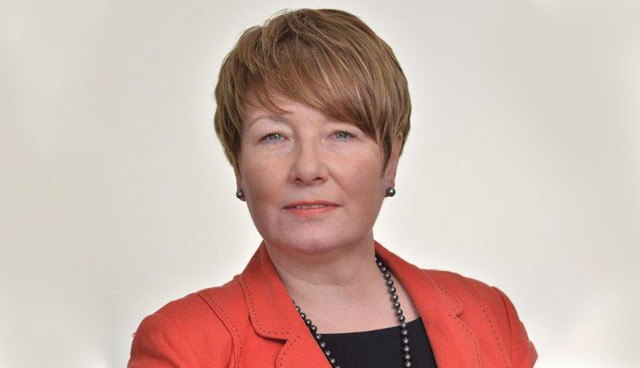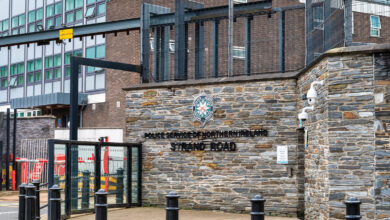Police Ombudsman seeks powers reform

The Department of Justice is consulting on the possibility of a dedicated Police Ombudsman Act, following a request to reform and broaden the Ombudsman’s powers.
The request comes after the publication of a five-year review report by the Ombudsman. The review formed part of a stocktake ordered by Justice Minister Naomi Long MLA upon taking up her post in 2020 to look at the arrangements for policing oversight and accountability in Northern Ireland.
The review also looked at the interfaces between the various oversight bodies and set out proposals on how the arrangements could be further strengthened. Alongside the stocktake, the Minister also received recommendations from the Police Ombudsman on proposed changes to the powers of her office.
In December 2021, the Department launched a consultation on a stocktake of policing oversight and accountability, along with recommendations made by the Police Ombudsman in her Five-Year Review.
The Ombudsman is required to review the workings of the legislation relating to their powers every five years and provide a report to the Department. Three such reviews have taken place to date, but no recommendations have been acted on due to a lack of political consensus, meaning existing legislation dates from 1998, without substantive change.
Northern Ireland now sits unique to England and Scotland, where reforms to complaints arrangements have been introduced, including the establishment of a new Independent Office for Police Complaints.
A number of reforms to the complaints regimes in England and Wales, Scotland and the Republic of Ireland, which have already taken place, include: legislating for the ongoing practice of keeping complainant and other interested parties informed; changes to the definition of ‘complaint’; powers of specified bodies to make ‘super-complaints’ where policing is significantly harming public interest; investigation of whistle-blowing claims outside of an ongoing investigation from current or former officers about serving officers; and disciplinary arrangement for former members of police forces.
Among the request for reform of Police Ombudsman Marie Anderson’s powers, which includes a total of 26 recommendations, most likely to receive attention is a desire to compel retired officers to co-operate with her office. Former RUC and PSNI officers are currently not obliged to take part in ombudsman investigations, a significant challenge when considering the volume of work undertaken by the Ombudsman in relation to historical complaints.
Summary of key recommendations of reform requested by the Police Ombudsman:
- That the initial term of the Police Ombudsman should be reduced to a term of five years, and that the Police Ombudsman should be eligible for reappointment for a further term of up to five years;
- In the public interest, any civilian staff operating directly in conjunction with police officers in the course of their policing functions should be brought within the remit of the Police Ombudsman for Northern Ireland for the purposes of complaints against those personnel;
- That the Police (NI) Act 1998 be amended to enable the Police Ombudsman to conduct mediation in appropriate circumstances, and that there be no requirement to investigate first;
- That the Police Ombudsman should be specifically empowered by statute to compel the attendance for interview of both witness and suspect officers;
- That the Police Ombudsman be given a power to compel retired or former police officers to submit to witness interview, and provide all relevant documentation to him, which is within their possession, custody, power, or control, when he is conducting investigations involving grave or exceptional matters; and
- That Regulation 26 of the RUC (Conduct) Regulations 2000 and the RUC (Conduct) (Senior Officers) Regulations 2000 be amended to provide a right to the Police Ombudsman to attend all hearings which take place following a Police Ombudsman investigation.
A potential stumbling block in this regard, and a concern raised in the past, around the power to compel witnesses to cooperate, is that this power is not available to the PSNI. It has also been suggested that the impact may be disproportionate on retired officers, who may not have access to the same support as serving officers under investigation by the Ombudsman.
Another potentially controversial recommendation, which the Department has suggested “may not be capable of attracting sufficient consensus” at this time to enable legislative change include the holding of disciplinary proceedings in public where it is in the public interest, with those in opposition suggesting increased risks to an officer’s personal safety.
A further major reform request from the Ombudsman is for a wider role for her office in relation to disciplining officers found to be in the wrong. Currently, the Police Ombudsman can make recommendations to the PSNI, however the Ombudsman is not involved in the disciplinary process and the PSNI are not compelled to accept recommendations. This is in contrast to England and Wales, where the Independent Office for Police Complaints (IOPC) has more extensive powers, particularly in relation to disciplinary issues.
The Ombudsman recommends that: “Regulation 26 of the RUC (Conduct) Regulations 2000 and the RUC (Conduct) (Senior Officers) Regulations 2000 be amended to provide a right to the Police Ombudsman to attend all hearings which take place following a Police Ombudsman investigation.”
The consultation of the policing oversight stocktake and the Police Ombudsman’s Five-Year Review will run to 1 March 2022.





